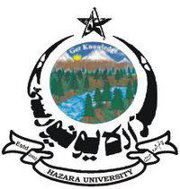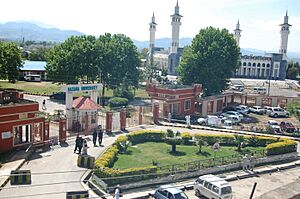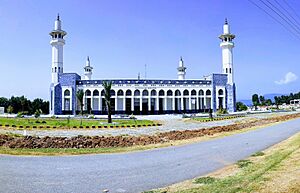Hazara University facts for kids
|
جامعہ ہزارہ
|
|
 |
|
|
Other name
|
HU |
|---|---|
| Motto | Get Knowledge |
| Type | Public |
| Established | 2002 |
| Accreditation | Higher Education Commission (Pakistan), Pharmacy Council of Pakistan |
| Chancellor | Governor of Khyber Pakhtunkhwa |
| Vice-Chancellor | Prof. Dr. Mohsin Nawaz Khan |
| Location |
,
Pakistan
34°25′12″N 73°15′0″E / 34.42000°N 73.25000°E |
| Campus | 250 acres (100 ha) |
| Colors | |
The Hazara University (HU) is a big public university in Mansehra, Khyber Pakhtunkhwa, Pakistan. It is a place where students go to learn after high school. The university was started in 2002. It helps young people get a good education.
Contents
What is Hazara University?
Hazara University is a well-known place for higher education. The Higher Education Commission of Pakistan officially recognizes it. This means the degrees from Hazara University are valid and respected. The university's motto is "Get Knowledge."
Where is the University Located?
The university campus is in a special historical area. It is near where the ancient Gandhara and Ashoka civilizations once thrived. The campus also faces the famous silk route. This route was an old trading path connecting Pakistan with China and Central Asia.
The land for the university was kindly given by Haji Abdul Hanan Khan Swati. He was an important landowner in Dhodial. The university building was first a hospital. It was built by Khan Khudadad Khan Swati, who was Pakistan's first health minister. Later, it became Hazara University.
What Can You Study at Hazara University?
Hazara University has many different departments. They are grouped into several main areas called faculties. Students can earn Bachelor's degrees here. These degrees are in subjects like arts, business, social sciences, and science.
Arts and Humanities
This faculty is for students who love history, languages, and creative subjects.
- Archaeology: Studying ancient times and old objects.
- Architecture: Learning how to design buildings.
- Art & Design: Developing artistic skills.
- Communication & Media Studies: Understanding how people share information.
- Conservation Studies: Protecting historical places and nature.
- Education: Learning to become a teacher.
- English: Studying the English language and literature.
- Geology: Exploring the Earth's rocks and landforms.
- Pakistan Studies: Learning about Pakistan's history and culture.
- Tourism & Hospitality: Preparing for jobs in travel and hotels.
- Urdu: Studying the Urdu language.
Biological and Health Sciences
This faculty focuses on life sciences and health.
- Agriculture: Learning about farming and growing food.
- Biochemistry: Studying the chemistry of living things.
- Biotechnology: Using living things to create new products.
- Biotechnology & Genetic Engineering: Changing genes for specific purposes.
- Botany: The study of plants.
- Human Genetics: Understanding human genes.
- Microbiology: Studying tiny living things like bacteria.
- Pharmacy: Learning about medicines and how they work.
- Zoology: The study of animals.
Law and Social Sciences
This faculty explores how societies work and how laws are made.
- Economics: Understanding money and how people use resources.
- Islamic & Religious Studies: Learning about different religions.
- Law: Studying rules and justice.
- Management Sciences: Learning how to run organizations.
- Political Science: Understanding governments and politics.
- International Relations: Studying how countries interact.
- Psychology: Learning about the human mind and behavior.
- Public Policy and Administration: How governments make decisions.
- Sociology: Studying human society and groups.
Natural and Computational Sciences
This faculty is for students interested in science, math, and computers.
- Bioinformatics: Using computers to study biology.
- Chemistry: Studying what things are made of.
- Environmental Sciences: Learning about the environment and its protection.
- Information Technology: Working with computers and software.
- Mathematics: Studying numbers, shapes, and patterns.
- Physics: Understanding how the universe works.
- Telecommunication: Learning about phones and internet.
- Statistics: Using numbers to understand information.
 | Misty Copeland |
 | Raven Wilkinson |
 | Debra Austin |
 | Aesha Ash |



